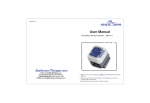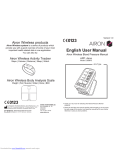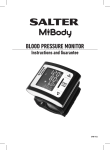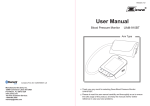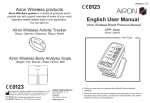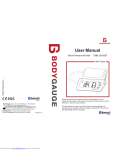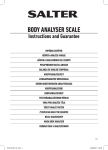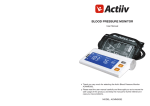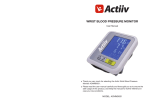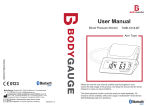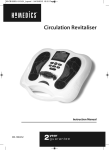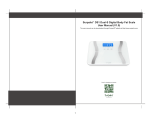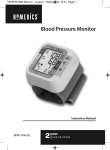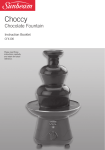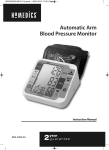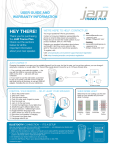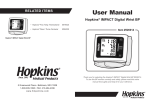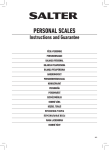Download BLOOD PRESSURE MONITOR
Transcript
E BLOOD PRESSURE MONITOR Instructions and Guarantee BPA-9300 GB SAFETY INFORMATION The below signs might be in the user manual, labeling or other components. They are the requirement of standard and using. 0120 Symbol for “THE OPERATION GUIDE MUST BE READ” Symbol for “TYPE BF APPLIED PARTS” Symbol for “COMPLIES WITH MDD 93/42/EEC REQUIREMENTS” Symbol for “ENVIRONMENT PROTECTION - Wast electrical products should not be disposed of with household waste. Please follow local guidelines. Symbol for “MANUFACTURER” Symbol for “DIRECT CURRENT” Symbol for “SERIAL NUMBER” F1 EC REP Symbol for “Authorised Representative in the European Community” For indoor use only Symbol for “Class II Equipment” T1A/250V Φ3.6*10CCC Symbol for “MANUFACTURE DATE” WEEE EXPLANATION This marking indicates that this product should not be disposed with other household wastes throughout the EU. To prevent possible harm to the environment or human health from uncontrolled waste disposal, recycle it responsibly to promote the sustainable reuse of material resources. To return your used device, please use the return and collection systems or contact the retailer where the product was purchased. They can take this product for environmental safe recycling. BATTERY DIRECTIVE This symbol indicates that batteries must not be disposed of in the domestic waste as they contain substances which can be damaging to the environment and health. Please dispose of batteries in designated collection points. GUARANTEE Salter will repair or replace the product, or any part of this product, free of charge if within 2 years of the date of purchase, it can be shown to have failed through defective workmanship or materials. This guarantee covers working parts that affect the function of the blood pressure monitor. It does not cover cosmetic deterioration caused by fair wear and tear or damage caused by accident or misuse. Opening or taking apart the blood pressure monitor or its components will void the guarantee. Claims under guarantee must be supported by proof of purchase and be returned carriage paid to Salter (or local Salter appointed agent if outside the UK). Care should be taken in packing the blood pressure monitor so that it is not damaged while in transit. This undertaking is in addition to a consumer’s statutory rights and does not affect those rights in any way. For UK Sales and Service contact HoMedics Group Ltd, HoMedics House, Somerhill Business Park, Five Oak Green Road, Tonbridge, Kent TN11 0GP, UK. Helpline Tel No: (01732) 360783. e-mail: [email protected]. For Ireland, please contact Petra Brand Masters, Unit J4 Maynooth Business Campus, Maynooth, Co. Kildare, Ireland. Tel +00 353 (0) 1 6510660. e-mail [email protected]. www.salterhousewares.com/servicecentres 2 CAUTION GB • This device is intended for adult use only. • This device is intended for non-invasive measuring and monitoring of arterial blood pressure. It is not intended for use on extremities other than the arm or for functions other than obtaining a blood pressure measurement. • Do not confuse self-monitoring with self-diagnosis. This unit allows you to monitor your blood pressure. Do not begin or end medical treatment, relay solely on a doctor for treatment advice. • If you are taking medication,consult your physician to determine the most appropriate time to measure your blood pressure. Never change a prescribed medication without consulting your physician. • This unit is not suitable for continuous monitoring during medical emergencies or operations. • If the cuff pressure exceeds 40 kPa (300 mmHg), the unit will automatically deflate. Should the cuff not deflate when pressures exceeds 40 kPa (300 mmHg), detach the cuff from the arm and press the any button to stop inflation. • To avoid measurement errors, carefully read this manual before using the product. • The equipment is not AP/APG equipment and not suitable for use in the presence of a flammable anesthetic mixture with air of with oxygen or nitrous oxide. • The operator shall not touch output of AC adapter and the patient simultaneously. • To avoid measurement errors, please avoid strong electromagnetic field radiated interference signal or electrical fast transient/burst signals when using the AC adaptor. • The user must check that the equipment functions safely and see that it is in proper working condition before being used. • Please note that Luer lock connectors are not used on the product and please DO NOT change any provided connectors. Do not wind the air tube round the neck. • Please use ACCESSORIES and detachable parts specified/ authorised by MANUFACTURER. • Otherwise, it may cause damage to the unit or danger to the user/patients. • Manufacturer will make available on request circuit diagrams, component parts list etc. • After the cuff inflated long time, the patient’s arm and fingers will is insufficient, anaesthesia, destending pain and ecchymosis. • Please use the device under the environment which was provided in the user manual, otherwise, the performance and lifetime of the device will been impacted and reduced. • During use, the patient will contact with the cuff. The materials of the cuff have been tested and found to comply with requirements of ISO 10993-5:2009 and ISO 10993-10:2010. It will not cause any potential alergic reaction or contact injury. • At least two years of reliable service, without need for calibration. • Please dispose of ACCESSORIES, detachable parts, and the EQUIPMENT according to the local guidelines. • When the device is used to measure patients who have common arrhythmias such as atrial or ventricular premature beats or artrial fibrillation, results may vary. Please consult your physician about the result. • This device is contraindicated for any female subject who may be suspected of, or is pregnant. Besides provided inaccurate readings, the affects of this device on the fetus are unknown. 3 GB DISPLAY GUIDE SYMBOL DESCRIPTION EXPLANATION Systolic Blood Pressure High blood pressure Diastolic Blood Pressure Low blood pressure Pulse per minute Beats per minute, BPM User 1 Start measurement for user 1 User 2 Start measurement for user 2 Shocking reminder Shocking will result in inaccurate Low Battery Low battery and please replace the batteries mmHg Measurement unit of blood pressure (1mmHg = 0.133kPa) kPa Measurement unit of blood pressure (1kPa = 7.5mmHg) Memory Display the serial number of the measurement Current Time Month/Day (Hour:Minute) Deflating Exhaust the air in the cuff Arrhythmia Irregular Heartbeat Heartbeat Heartbeat detection during the measurement 4 INSTALLING AND REPLACING THE BATTERIES Battery powered mode: 6VDC 4*AA alkaline batteries 1. Slide off the battery cover. 2. Install the batteries by matching the correct polarity, as shown. 3. Close the battery door. CAUTION • In order to get the best effect and protect you monitor,please use the right battery which complies with CE safety standard. Replace the batteries under following circumstances: • displays on the LCD • The LCD display dims • When powering on the monitor, the LCD doesn’t light up. CAUTION • Remove batteries if the device is not likely to be used for some time. • The old battery is harmful to the environment, so please dispose of according to the guidlines on page 2. • Remove the old battery from the device and follow your local recycling guidelines. • Do not dispose of batteries in fire. Batteries may explode or leak. SETTING DATE, TIME AND MEASUREMENT UNIT 1. When the monitor is OFF, press and hold button to enter Time Setting Mode. 2.The [YEAR] numeral will start blinking. Press button to change the numeral. Each press will increase the numeral by one in a cycling manner. 3.Press button again to confirm [YEAR]. Then the numeral representing [MONTH] blinks. 4. Repeat step 2 and 3 to confirm [MONTH] and [DAY]. 5. Repeat step 2 and 3 to confirm [HOUR] and [MINUTE]. Hour Format: 24-Hour. 6. Repeat step 2 and 3 to confirm the measurement unit. 7. After confirming the measurement unit, the LCD will display “dOnE” and the monitor will shut off. TIE THE CUFF 1. Tie the cuff on your upper arm, position the tube off-center toward the inner side of arm in line with the little finger. 2. The cuff should be snug but not too tight. You should be able to insert one finger between the cuff and your arm. 3. Sit comfortably with your tested arm resting on a flat surface. 4. Correct Posture for Patients with Hypertension, especially for Hypertension patient: - Bare your arm before applying the cuff. - Sit comfortably with legs uncrossed, feet flat on the floor, back and arm supported. The centre of the cuff should be maintained at the same level as the heart. • Rest for 5 minutes before measuring. • Wait at least 3 minutes between measurements. This allows your blood circulation to recover. • For a meaningful comparison, try to measure under similar conditions. For example, take daily measurements at approximately the same time, on the same arm, or as directed by a physician. 5 GB GB START THE MEASUREMENT When the monitor is off, press button to turn on the monitor and it will finish the whole measurement, and then save the measurement data for User 1. The same for User 2. 1.Press the to power off , otherwise it will turn off within one minute. Tips: a. When the measurement has finished, press another user button, the blood pressure monitor will begin measuring again. b. Maximum 60 records are both for user 1 and user 2. RECALL THE RECORDS 1.When the monitor is OFF, press button to access the memory. 2.The LCD will display the latest measuring result of the selected user ID which completes the last measurement. * The record number, measuring date and measuring time will be displayed alternatively. 3.Press button to rotate the history records. 4. When in the memory mode, press button to recall the measurement history of User 1, or press button to recall the measurement history. 5. When no history stored for the specific user in the monitor, press button and the LCD will display ---. CAUTION The most recent record (1) is shown first. Each new measurement is assigned to the first (1) record. All other records are pushed back one digit (e.g., 2 becomes 3, and so on), and the last record (60) is dropped from the list. DELETING THE RECORDS 1.When under the query mode, press and hold button for 3 seconds to clear the memory. 2. When the LCD display “dEL ALL”, press button to confirm. 3. The LCD will display “dEL dOnE” and then shut off. 4.If you wish to stop clearing the memory, you may press the other button, rather than button to turn off the monitor, or wait until the monitor shuts off. TIPS FOR MEASUREMENT It can cause inaccuracy if the measurement is taken in the following circumstances. 1. Immediately after eating a meal or drinking. 2. Immediate measurement after tea, coffee or smoking. 3. Immediately after taking a bath. 4. When talking or moving your fingers. 5. In a very cold environment. 6. When you need the lavatory. 7. Rest for 5 minutes before measuring 8. Wait at least 3 minutes between measurements. This allows your blood circulation to recover. 9.Try to measure under similar conditions for example, take daily measurements at approximately the same time, on the same arm, or as directed by a physician. 6 ADVICE FOR USE AND CARE GB To obtain the best performance, please follow below instructions. • Put in a dry place and avoid the sunshine. • Avoid immersing it in the water. Clean it with a dry cloth. • Avoid shaking and collision. • Avoid dusty environment and unstable temperature surrounding. • Use the slightly damp cloth to remove the dirt. • Avoid washing the cuff. ABOUT BLOOD PRESSURE What are systolic pressure and diastolic pressure? When ventricles contract and pump blood out of the heart, the blood pressure reaches its maximum value in the cycle, which is called systolic pressure. When the ventricles relax, the blood pressure reaches its minimum value in the cycle, which is called diastolic pressure. Systolic blood discharging artery Diastolic blood entering vein press relax What is the standard blood pressure classification? CAUTION Only a physician can tell your normal BP range. Please contact a physician if your measuring result falls out of the range. Kindly note that only a physician could tell whether your blood pressure value has reached a dangerous point. Diastolic blood pressure (mmHg) The blood pressure classification published by World Health Organization (WHO) and International Society of Hypertension (ISH) in 1999 is as follows: Grade 3 hypertension (severe) Grade 2 hypertension (moderate) Grade 1 hypertension (mild) Subgroup: borderline High-normal blood pressure Normal blood pressure Optimal blood pressure Systolic blood pressure (mmHg) Blood pressure (mm Hg) Level Optimal Normal High-normal Mild Moderate Severe SYS <120 120–129 130–139 140–159 160–179 ≥180 DIA <80 80–84 85–89 90–99 100–109 ≥110 7 GB IRREGULAR HEARTBEAT DETECTOR This Blood Pressure Monitor is equipped with an intelligent function of Irregular Heartbeat (IHB) Detector. During each measurement, this equipment records the heartbeat intervals and works out the standard deviation. If the calculated value is larger than or equal to 15, this equipment will light up the IHB symbol on the screen when displaying the measuring result. CAUTION The appearance of the IHB icon indicates that a pulse irregularity consistent with an irregular heartbeat was detected during measurement. Usually this is NOT a cause for concern. However, if the symbol appears often, we recommend you seek medical advice. Please note that the device does not replace a cardiac examination, but serves to detect pulse irregularities at an early stage. QUESTIONS & ANSWERS Why my blood pressure varies even in one day? 1.Individual blood pressure varies during the day. It also affected by the way you tie your cuff and your measurement position, so please take the measurement under similar conditions. 2.The variance of the pressure is greater if the person take medicine. 3. Wait at least 3 minutes for another measurement. Why are the blood pressure readings I get from the hospital different from home? The blood pressure readings are different even during 24 hour because of the weather, emotion, exercise etc, especially the “white coat” effect in hospital which makes the results are higher than the ones at home. The attention you need to pay when you measure your blood pressure at home: • If the cuff is tied properly. • If the cuff is too tight or too loose. • If the cuff is tied on the upper arm. • If you feel anxious or under stress. Take deep breaths 2-3 times before beginning. Advice: Relax for 5 minutes before measurement if necessary. If the result is the same if measuring on the right arm? It is ok to measure either arm, but there will be some different results for different persons, so it is suggested you measure the same arm every time. 8 TROUBLESHOOTING This section includes a list of error messages and frequently asked questions for problems you may encounter with your blood pressure monitor. If the products is not operating as you think it should, check here before arranging for servicing. PROBLEM No power Low batteries Error message SYMPTOM CHECK THIS REMEDY Batteries are exhausted. Replace with new batteries Batteries are inserted incorrectly. Insert the batteries correctly Batteries are low. Replace with new batteries E 1 shows The cuff is not secure Refasten the cuff and then measure again. E 2 shows The cuff is very tight Readjust the cuff, not too loose or too tight and then measure again. E 3 shows The pressure of the cuff is excess. Relax for a moment and then measure again. E 10 or E 11 shows The monitor detected motion, talking or the pluse is too poor while measuring. Relax for a moment and then measure again. E 20 shows The measurement process does not Loosen the clothing on the arm and detect the pulse signal. then measure again. E 21 shows The treatment of the measurement failed. Relax for a moment and then measure again. A calibration error occurred. Retake the measurement. If the problem persists, contact the retailer or our customer service department for further assistance. Refer to the warranty for contact information and return instructions. Display is dim or will not light up. Show on the display EExx, shows on the display. 9 GB GB SPECIFICATIONS Power supply 6VDC 4*AA alkaline batteries Display mode Digital LCD V.A.78*92mm Measurement mode Oscillographic testing mode Measurement range Rated cuff pressure: 0kpa - 40kpa (0mmHg~300mmHg) Measurement pressure: 4kPa-34kPa (40mmHg-230mmHg) pulse value: (40-199) beat/minute Accuracy Pressure: 5ºC-40ºc within±0.4kpa(3mmHg) pulse value:±5% Normal working condition Temperature: 5ºC to 40ºC Relative humidity ≤85% Atmospheric pressure: 86kPa to 106kPa Storage & transportation condition Temperature: -20ºC to 60ºC RH: 10% to 93% Atmospheric pressure: 50kPa to 106kPa Measurement perimeter of the wrist About 22cm–32cm Net Weight Approx. 385g (Excluding the dry cells) External dimensions Approx. 120*160*69mm Attachment 4*AA alkaline batteries,user manual Mode of operation Continuous operation Degree of protection Type BF applied part Protection against ingress of water IP22 Software version V01 WARNING: No modification of this equipment is allowed. 10 CONTACT INFORMATION For more information about our products, please visit www.salterhousewares.com For UK Sales and Service contact HoMedics Group Ltd, HoMedics House, Somerhill Business Park, Five Oak Green Road, Tonbridge, Kent TN11 0GP, UK. Helpline Tel No: (01732) 360783. For Ireland, please contact Petra Brand Masters, Unit J4 Maynooth Business Campus, Maynooth, Co. Kildare, Ireland. Tel +00 353 (0) 1 6510660. e-mail [email protected]. www.salterhousewares.com/servicecentres EMC GUIDANCE Table 1 Guidance and manufacturer’s declaration – electromagnetic emissions - for all EQUIPMENT and SYSTEMS Guidance and manufacture’s declaration – electromagnetic emission The BPA-9300 is intended for use in the electromagnetic environment specified below. The customer or the user of the BPA-9300 should assure that it is used in such an environment. Emission test Compliance RF emissions CISPR 11 Group 1 RF emission CISPR 11 Class B Harmonic emissions IEC 61000-3-2 Not applicable Voltage fluctuations/ flicker emissions IEC 61000-3-3 Not applicable Electromagnetic environment - guidance The BPA-9300 must emit electro-magnetic energy in order to perform its intended function. Nearby electronic equipment may be affected. 11 GB GB Table 2 Guidance and manufacturer’s declaration – electromagnetic immunity – for all ME EQUIPMENT and ME SYSTEMS Guidance and manufacture’s declaration – electromagnetic emission The BPA-9300 is intended for use in the electromagnetic environment specified below. The customer or the user of the BPA-9300 should assure that it is used in such an environment. Immunity test IEC 60601 test level Compliance level Electrostatic discharge (ESD) IEC 61000-4-2 ±6 kV contact ±8 kV air ±6 kV contact ±8 kV air Electrical fast transient/burst IEC 61000-4-4 ±2 kV for power supply lines N/A Surge IEC 61000-4-5 ±1 kV line(s) to line(s) ±2 kV line(s) to earth N/A Voltage dips, short interruptions and voltage variations on power supply input lines IEC 61000-4-11 <5% UT (>95% dip in UT ) for 0.5 cycle N/A 40% UT (60% dip in UT ) for 5 cycles N/A 70% UT (30% dip in UT ) for 25 cycles N/A <5% UT (>95% dip in UT) for 5 sec N/A 3A/m 3A/m Power frequency 3A/m (50Hz) magnetic field IEC 61000-4-8 NOTE UT is the a.c. mains voltage prior to application of the test level. 12 Electromagnetic environment - guidance Floors should be wood, concrete or ceramic tile. If floors are covered with synthetic material, the relative humidity should be at least 30%. Power frequency magnetic fields should be at levels characteristic of a typical location in a typical commercial or hospital environment. Table 4 Guidance and manufacturer’s declaration – electromagnetic immunity – for ME EQUIPMENT and ME SYSTEMS that are not LIFE-SUPPORTING Guidance and manufacture’s declaration – electromagnetic emission The BPA-9300 is intended for use in the electromagnetic environment specified below. The customer or user of the BPA-9300 should assure that it’s used in such an environment. Immunity test IEC 60601 test level Compliance level Electromagnetic environment - guidance Conducted RF IEC 61000-4-6 3 Vrms 150 kHz to 80 MHz N/A Portable and mobile RF communications equipment should be used no closer to any part of the BPA-9300, including cables, than the recommended separation distance calculated from the equation applicable to the frequency of the transmitter. Recommended — separation distance d = 1.167 √P Radiated RF IEC 61000-4-3 3 V/m 80 MHz to 2.5 GHz 3 V/m — d = 1.167 √P 80 MHz to 800 MHz — d = 2.333 √P 800 MHz to 2.5 GHz where P is the maximum output power rating of the transmitter in watts (W) according to the transmitter manufacture and d is the recommended separation distance in metres (m). Field strengths from fixed RF transmitters, as determined by an electromagnetic site survey,a should be less than the compliance level in each frequency range.b Interference may occur in the vicinity of equipment marked with the following symbol: NOTE 1 At 80 MHz and 800 MHz, the higher frequency range applies. NOTE 2 These guidelines may not apply in all situations. Electromagnetic propagation is affected by absorption and reflection from structures, objects and people. a Field strengths from fixed transmitters, such as base stations for radio (cellular / cordless) telephones and land mobile radios, amateur radio, AM and FM radio broadcast cannot be predicted theoretically with accuracy. To assess the electromagnetic environment due to fixed RF transmitters, an electromagnetic site survey should be considered. If the measured field strength in the location in which the BPA-9300 is used exceeds the applicable RF compliance level above, the BPA-9300 should be observed to verify normal operation. If abnormal performance is observed, additional measures may be necessary, such as re-orienting or relocating the BPA-9300. b Over the frequency range 150 kHz to 80 MHz, field strengths should be less than 3V/m. 13 GB GB Table 6 Recommended separation distances between portable and mobile RF communications equipment and the EQUIPMENT or SYSTEM – for ME EQUIPMENT or ME SYSTEM that are not LIFE-SUPPORTING Recommended separation distances between portable and mobile RF communications equipment at the BPA-9300. The BPA-9300 is intended for use in an electromagnetic environment in which radiated RF disturbances are controlled. The customer or the user of the BPA-9300 can help prevent electromagnetic interference by maintaining a minimum distance between portable and mobile RF communications equipment (transmittters) and the BPA-9300 as recommended below, according to the maximum output power of the communications equipment. Separation distance according to frequency of transmitter (m) Rated maximum output power of transmitter (W) 150 kHz to 80 — MHz d = 1.167 √P 80 MHz to 800 — MHz d = 1.167 √P 800 MHz to 2.5—GHz d = 2.333 √P 0.01 N/A 0.117 0.233 0.1 N/A 0.369 0.738 1 N/A 1.167 2.333 10 N/A 3.690 7.377 100 N/A 11.67 23.33 For transmitters rated at a maximum output power not listed above, the recommended separation distance d in metres (m) can be determined using the equation applicable to the frequency of the transmitter, where P is the maximum output power rating of the transmitter in watts (W) according to the transmitter manufacturer. NOTE 1 At 80MHz and 800MHz, the separation distance for the higher frequency range applies. NOTE 4 These guidelines may not apply in all situations. Electromagnetic propagation is affected by absorption and reflection from structures, objects and people. 14 Register your product today at: www.homedicsgroup.com/register 0120 E HoMedics Group Ltd HoMedics House, Somerhill Business Park, Five Oak Green Road, Tonbridge, Kent TN11 0GP, UK. www.salterhousewares.co.uk IB-BPA9300-GB-0114-01
















